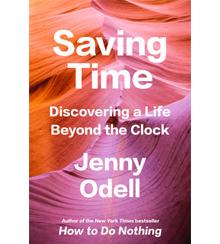Clocking out: Millennials and the workforce
A new book questions old paradigms about the meaning of time and work.

Saving Time: Discovering a Life Beyond the Clock
by Jenny Odell, Random House, 2023
One of the most infamous charts in modern macroeconomics is a comparison of productivity and wages in the US since the end of the Second World War. In the decades following 1945, wages moved upward in lockstep with productivity as the economy modernized and became more efficient. But since the end of the 1970s, the two lines of the productivity–wage graph have dramatically diverged. Productivity has continued to grow at a healthy rate, but incomes have stalled.
For the generation of Americans who grew up in this stalled-income economy, work has not delivered the life they were promised (i.e., study hard and get a secure job to be able to afford a home, a good life, and savings for retirement). And a number of books in recent years, including those by Anne Helen Petersen and Emily Guendelsberger, have chronicled the experiences of millennials who joined the workforce only to find that the social contract enjoyed by their parents no longer applied to them.
A recent compelling addition to this corpus is Jenny Odell’s Saving Time, which tackles generational burnout and the struggles of the contemporary worker with philosophical intent. “I doubt burnout has ever been solely about not having enough hours in the day,” Odell writes. “What first appears to be a wish for more time may turn out to be just one part of a simple, yet vast, desire for autonomy, meaning, and purpose.”
Odell, whose previous works include the bestselling book How to Do Nothing: Resisting the Attention Economy, argues that we have lost meaning and purpose because the way we think about time has been hijacked by work within a hyper-capitalist society. She believes we’re now “living on the wrong clock.” What’s more, when we bridle against this economic fate, we invariably look in the wrong places for help, turning to the self-optimization industry and the “productivity bros” who peddle advice on how to “crush your goals,” break down your day into minute chunks, and retain a laser-like focus. “This approach perfectly fits the neoliberal worldview of total competition,” Odell writes.
She is similarly unconvinced by the other end of the scale: the cottage industry of books and courses that advocate slowing down in order to reclaim yourself and your creativity. “As long as slowness is invoked merely to make the machine of capitalism run faster, it risks being a cosmetic fix,” she writes.
Karl Marx was first to observe that capital “frees time in order to appropriate it for itself.” Odell argues that we treat time off as an opportunity to prepare for high performance once work resumes. She cites the example of luxury resorts that offer well-being programs requiring guests to set goals for their stay, and that track their sleep, nutrition, and blood flow. For Odell, even the practice of documenting holiday and weekend activities on social media reinforces the notion that leisure must still involve doing something rather than simply “being” or shutting off completely. In a nod to the work of the 20th-century philosopher Josef Pieper, Odell prefers to think of time off as an opportunity to enter a different state of mind, “one that, like falling asleep, can be achieved only by letting go.”
Millennials joined the workforce only to find that the social contract enjoyed by their parents no longer applied to them.
In perhaps the finest section of Saving Time, Odell comes across an “embarrassingly spot-on characterization” of her own life in an academic paper. The sociologist Hartmut Rosa sketches out the life and habits of a fictitious professor named Linda. Linda has a job and some means, but she feels she is chronically busy, “always falling short and running behind” her various commitments. It is possible to be genuinely ensnared by a lack of time—there are those who have to work multiple jobs to pay the rent while also raising children—but Rosa argues that Linda’s predicament is self-generated. According to Odell’s analysis, Linda sees herself as “controlled and surveilled” by society’s expectation that she be busy and productive at all times, by what Rosa neatly calls the “logic of expansion.” This concept has been so thoroughly ingrained that it has been adopted even by those with plenty of agency.
This analysis is squeezed into the barnstorming first half of Saving Time. In the second half, Odell ponders other aspects of our relationship with time, including a long, brooding consideration of the climate crisis (which she argues is so difficult to address because it operates on a longer, slower plane), and the lessons of those, such as the disabled and the incarcerated, who are prevented from relating to time in the same way that the rest of society does.
Odell is adamant that for those of us with the resources to escape from the “time–pressure illusion” that has captured Linda, the rejection must be complete, that “the forward-leaning ego that grasps at time has to die.” This is not easy, and her suggestion of what might replace this state of affairs, being “more alive in any given moment—a movement outward and across, rather than shooting forward on a narrow, lonely track,” could come from meditation. However, Saving Time is worth the investment for Odell’s excoriation of the productivity industry and the irony at its core, of “a life consumed by the effort to make more of itself.”
Author profile:
- Mike Jakeman is a freelance journalist and has previously worked for PwC and the Economist Intelligence Unit.




